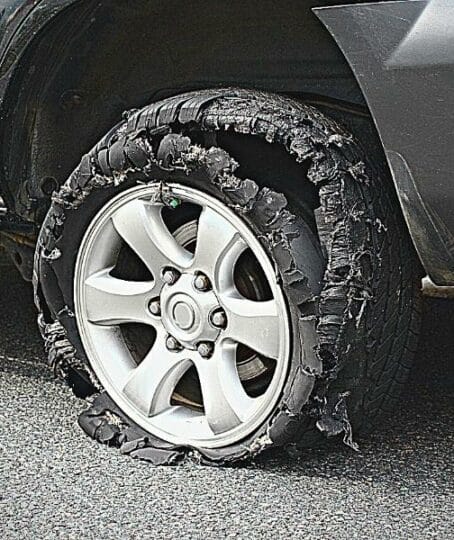
What to Do If You’re Injured in a Car Accident While Working in Illinois Work-related car accidents are common. Between...


There are many potential causes of tire blowouts, but the most common cause is under inflation. Due to under-pressure, the tire starts to sag, eventually buckling under the car’s weight. When traveling at highway speeds, the underinflated tire may burst, causing the vehicle to jerk suddenly, and leading to an accident. Other reasons for tire blowouts include overloading, wear and tear, and speeding.

Drivers should be alert and aware of the potential causes of tire blowouts, as they can be a major road hazard. The following sections investigate the most common types of blowouts and how they cause accidents.
Driving with underinflated tires creates a risk because the low pressure can increase sidewall stress. When there is excess flex and pressure on the sidewalls, it causes the area to overheat. The heat plays hob with the tire structure and increases the probability of a blowout.
When ferrying goods for your home or business, there is a major risk of tire blowouts if you fail to follow the payload requirements of your car. The extra weight of the load will put additional pressure on the tires and cause them to suffer excessive heat, causing a blowout.
When driving on overinflated tires, encountering road debris could become hazardous. If you pump too much pressure into the tires, they could become less flexible and more rigid, which elevates the chances of a blowout upon impact with sharp objects.
The more mileage your car gets, the more attentive you need to be, especially regarding tires and the performance of components such as brakes and shocks. Regarding tires, the threads can wear down with time and lose traction. The aftermath is an increased susceptibility to blowouts, especially where speeding and overloading are involved.
You stand a higher risk of getting a tire blowout if you recently drove off-road or along paths filled with construction debris. Punctures caused by nails, glass, or screws can lead to deflation, leading to under inflation that eventually causes blowouts.
Manufacturing defects are rare, but can cause tire blowouts. A new tire can seem to be in safe condition on the outside, but upon further inspection, you could find defects in the rubber layering, improper component bonding, or foreign objects lodged in the tire. These faults can greatly increase the likelihood of blowouts.
Poor road maintenance, such as potholes, debris, or uneven surfaces, can cause severe damage to the tires and increase the possibility of a blowout.
Driving at high speeds generates more heat in your tires, which can cause them to degrade more quickly and increase the risk of a blowout.
Improper tire maintenance is another cause of tire blowouts. As a driver, you should constantly monitor your car's tire pressure. If it's underinflated, that can increase the likelihood of blowouts. The same can happen if it's overinflated.
Tire balancing and rotation are also necessary for regular maintenance. A tire that's not rotated will not wear evenly. This could then create weak spots that can elevate the risk of blowouts. Rotating your tires every 6000 miles will reduce the risk of blowouts from uneven wear.
Tire blowouts can cause many types of accidents, including:
These crashes involve only a single car whose tire blows out. Although they only involve one vehicle, single-vehicle accidents caused by tire blowouts can cause severe injuries to the driver or passengers. The tire blowout can cause the car to roll over, sway into a ditch, or hit an object or pedestrian on the road.
Unlike single-vehicle accidents, multi-vehicle accidents resulting from tire blowouts often involve many casualties. For instance, when one car's tire blowout incident causes a driver to lose control, a diver in another vehicle may swerve to avoid hitting the affected car.
However, in the process, he or she may end up in a head-on collision with an oncoming vehicle. These accidents give rise to complex liability cases where lawyers must work with investigators to prove negligence on the part of one or more parties.
Tire blowout crashes involving commercial vehicles can be highly catastrophic. For example, if you think about petrol tankers, consider the risk of fire, and if they are heavy goods vehicles, the payload could come loose, worsening the extent of the crash.
Evidence is required to determine liability in accidents that result from tire blowouts, especially if the crash involves multiple vehicles. When lawyers try to determine which party owed you a duty of care and failed, causing the accident, they first consider the following people and entities.
Drivers owe one another a general duty of care to avoid causing harm. If a driver fails to properly maintain his or her vehicle, and a tire blowout causes an accident as a result, he or she may be liable for subsequent injuries.
A car accident lawyer can help you determine if another driver was liable by reviewing witness accounts, police reports, and interviewing expert witnesses. If the driver is found to have acted negligently or maliciously and caused the accident, he or she can be held liable.
Are there known tire defects that could have caused them to blow out and cause the accident? If the answer is yes, your lawyer will establish a connection between the tire defects and the accident that caused your injuries and other damages.
If tire defects cause a car accident, a product liability lawyer can help file a suit against the tire manufacturer.
Local road authorities may be to blame when poor road conditions, such as portholes and debris, cause tire punctures, resulting in catastrophic tire blowouts. Proving negligence here will involve gathering evidence that shows how the road conditions led to the accident, rather than the behavior of the victim or the driver.
Knowing what to do after a car accident can help you financially recover after a tire blowout causes a crash. Victims of car accidents should take the following steps:
Get out from the wreckage if you can, or call for help. Don't stand or sit in the middle of the road. This elevates your risk of getting into a second accident. Help other people involved in the crash from unsafe situations at the accident scene if you can. Once safety is assured, call the police to report the accident.
Get checked out and receive medical attention from first responders. You should consider getting a full diagnosis at a hospital if you have serious injuries. Even if you don't have apparent injuries, you should still follow up with a primary care physician soon after the accident, as some car accident injuries may be latent.
Get the police to document what happened and write a report. If you are asked to write a statement, make it as accurate as possible. Lawyers can use this report later on when filing for your compensation.
Get the other drivers' contact or insurance information. Write down their names, phone numbers, addresses, and plate numbers. You can also note the make and model of their cars.
The next thing to do is to seek compensation for your injuries. This could include medical expenses, loss of wages, loss of ability to enjoy life, mental anguish, and disability, among others. An experienced lawyer can help you file a lawsuit to seek financial compensation from the negligent parties in the accident.
How much should you settle for after getting hit by a car? The answer here is typically guided by the severity of the injuries and suffering from the accident, the cost of medical care, and the amount lost in wages.
When deciding the settlement amount to accept for the tire blowout accident, consider the medical expenses incurred now and in the future.
Although it's not easy to quantify this form of damage, it's essential to consider the degree of emotional distress resulting from the accident when you seek compensation. An attorney or mental health expert can guide you on this.
Severe injuries from a tire blowout car crash can leave you unable to enjoy the things you used to do. For instance, you may struggle to be intimate with your spouse or enjoy sports with your kids. Consider this when deciding what compensation amount to take from the settlement negotiation.
Tire blowout accident cases are not small. There is potential to establish negligence on the part of multiple parties, and the degree of personal injury and property damage can be high. Filing a car accident claim can help make you whole again after a crash.

What to Do If You’re Injured in a Car Accident While Working in Illinois Work-related car accidents are common. Between...

Why Pedestrian Accidents in Parking Lots Surge During Summer in Illinois As temperatures rise, more individuals tend to engage in...

Drowsy drivers are a serious and often overlooked danger on Illinois roads. Each year, fatigued drivers contribute to thousands of...